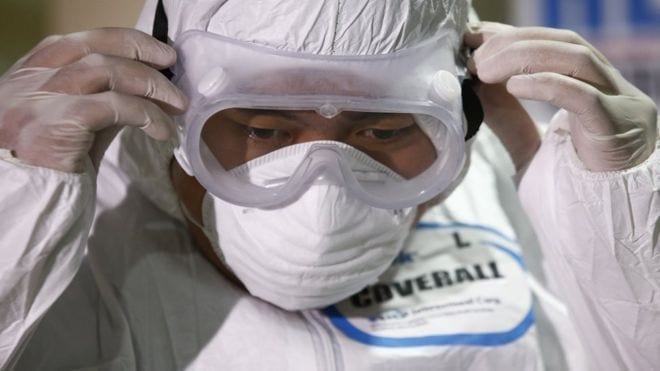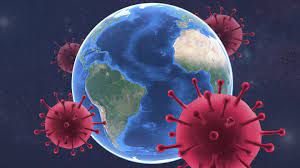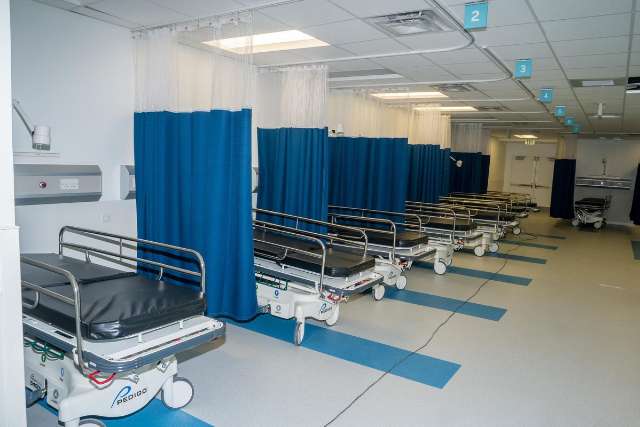PREPARING TO SURVIVE EMERGENCY CONTAINMENT MEASURES AGAINST THE CORONAVIRUS JUST IN CASE
(LOCK-DOWN OF CITIZENS AND NEIGBORHOODS)
Public Health Emergency Preparedness Series
At the time of compiling this list, there has been no case of COVID-19 in Ghana. I compiled this list in anticipation of the possible outbreak of the coronavirus in Ghana. I want to re-assure Ghanaians that in case we are in a lock down situation as part of containment measures against the coronavirus, we should not panic. We can weather the storm of the Coronavirus. But in order to be able to prevail and overcome the challenge that the Coronavirus cases may present, we MUST get a few things in order. I have provided the basic needs approach for individuals and for central and municipal government to adopt if needed, as they prepare for this real possibility. This tool alone would not save the lives of those may be diagnosed as being exposed to the virus, but may help to improve the living conditions of those not yet exposed, but may be in lock-down in their own homes, apartments, tenements or multi-dwelling buildings.
Preparation for a possible lock-down of those living in Individual Homes, Apartments and Tenements or multiple dwelling units in Accra City and other regional capitals. I will start with these:
Water Storage Capacity and Uses
In most homes in Ghana, we are lucky to have closed water storage systems or tanks. This allows many of the homes to have a considerable volume of water that could last for several weeks or more. Since we don’t know when a lock down situation would occur, preparedness and maintaining top-most personal hygiene are some of the most effective ways to survive public health threats such as this. To Drink:
About 3.7 Liters of water for men per day
And 2.7 liters for women
Of course one may need more depending on the type of work, exercise, health condition such as pregnancy and so on. But any amount in between these figures appears to be about right.
Water for other chores such as bathing, flashing toilets, etc.
Peace Time Water Usage:
In the developing nations like Ghana, the average person uses a minimum of 20 liters of water a day in peace time. This is equivalent to about one full bucket and a half. The average bucket size on the local market, has the capacity for 17 Liters of water. So about one and half buckets of water use per day by those who do not have improved toilet or Water Closets in their houses or offices.
Water Closet Use
When you add WC water use, then the average urban city dweller in Accra or Kumasi uses about 50 liters or 13.2 gallons of water a day.
Water Storage Capacity of about 2,000 liters
So if you have a tank of 2000 liters (528.3 gallons) divided by 13 gallons a day per one person, that whole content would last you 40.6 days. If you are a family of 4, then it would last you for only 10 days.
Food Items
The list is long depending on your individual and family preferences. They may include some but not all of the following:
Starches:
To Drink:
About 3.7 Liters of water for men per day
And 2.7 liters for women
Of course one may need more depending on the type of work, exercise, health condition such as pregnancy and so on. But any amount in between these figures appears to be about right.
Water for other chores such as bathing, flashing toilets, etc.
Peace Time Water Usage:
In the developing nations like Ghana, the average person uses a minimum of 20 liters of water a day in peace time. This is equivalent to about one full bucket and a half. The average bucket size on the local market, has the capacity for 17 Liters of water. So about one and half buckets of water use per day by those who do not have improved toilet or Water Closets in their houses or offices.
Water Closet Use
When you add WC water use, then the average urban city dweller in Accra or Kumasi uses about 50 liters or 13.2 gallons of water a day.
Water Storage Capacity of about 2,000 liters
So if you have a tank of 2000 liters (528.3 gallons) divided by 13 gallons a day per one person, that whole content would last you 40.6 days. If you are a family of 4, then it would last you for only 10 days.
Food Items
The list is long depending on your individual and family preferences. They may include some but not all of the following:
Starches:
- Gari
- Corn Dough
- Cassava Dough
- Dry vegetables such as okra, pepper and others
- Dry Rice
- Pre-cooked plantain or yam but frozen
- Pasta
- Konkonti Powder
- Fufu Powder
- Oatmeal
- Tom Brown
- Corn flour
- Bread Flour to make your own bread
- Tomato paste
- Spices

- Assortment of Frozen Vegetables
- Fish (Salt water or Fresh water)
- Seafood
- Meat
- Pork
- Sausages
- Eggs
- Smoked fish
- Smoked Meat
- Chicken, Guinea Fowl, Turkey, Ducks
- Tuna
- Sardines
- Corned Beef
- Cooking Oil
- Tomato Paste
- Groundnut Paste
- Mayonnaise
- Cubes (Maggie, Onga, kraft)
- Groundnuts and other nuts
- Onion, Okra, Garden Eggs
- Salt
- Pepper
- Milk
- Sugar
- Baby foods
- Charcoal
- Coal pot
- Extra filled Gas Cylinder
- Boxes of matches
- Candles
- Radio
- Torchlights
- Batteries for Radios
- For those with Gen-Sets (Additional Petrol or Diesel)
- Cash money (always comes in handy in a period of scarcity)

- At least two months’ supply of prescription drugs for those with chronic conditions
- Two months’ supply of over-the-counter drugs and pain killers, topical ointments
- Bandage
- Cleaning Alcohol
- Gloves
- Breathing face masks
- Spare Tooth paste and brushes
- Soap
- Washing Detergents
- Body lotion
- Nail Clippers
- A good pair of Scissors
- Gauze
- Cotton
- Menstrual Pads
- Panty Liners
- Diapers for babies
- Diapers for ill Adults and Geriatrics
- Toilet Paper
- Tissue Paper
- Have novels and books you want to read handy
- Have the Bible or Koran handy depending on your faith
- Game Boards in which the entire family can participate to play
- Card games
- Music
- Getting to know your spouse or family better through better communication
- Avoid topics in conversations that could create tension in the immediate family
- Clean your house as a way of exercise body, mind and soul
- To avoid cabin sickness, spend time outdoors of your home if you have the space
- If you live in a single-room and you are single, entertain yourself with reading and doing chores, exercise and rest.
- Potable water
- Electricity
- Quarantine Wards
- Test Kits
- Isolation Wards
- Food Delivery to at Risk Families and institutions such as mental home, youth reform houses, prisons
- Cash distribution to needy families for medicine and food purchases
- Home medical care and visit for the chronically sick or aged
- Maintain Municipal Security, peace and order
- Visibility Police
- Supply chain of fresh produce and other food items is running smoothly
- Field Hospitals are created where there are many cases to be transported
- Effective field and in-hospital Triage
- Storage of the dead
- Produce Inventory for the Dead
- Picking up the Dead
- Burying the Dead
- Anticipate Business shot downs and economic losses
- Prepare to jump-start the economy with soft loans at marginal interest rates
 Author[/caption]
By: Dr. Ishmael Norman, Ph. D., JD.
Institute for Security, Disaster and Emergency Studies, ISDES
http://www.isdesghana.org,
[email protected],
Cell Phone/Whatsapp #: 0243-201410
This advisory piece was prepared for presentation at TV3
Panel Discussion at 8:20am on Saturday, the 29th February, 2020
TV3 Studios, Kanda, Accra.
Produced 2/28/2020]]>
Author[/caption]
By: Dr. Ishmael Norman, Ph. D., JD.
Institute for Security, Disaster and Emergency Studies, ISDES
http://www.isdesghana.org,
[email protected],
Cell Phone/Whatsapp #: 0243-201410
This advisory piece was prepared for presentation at TV3
Panel Discussion at 8:20am on Saturday, the 29th February, 2020
TV3 Studios, Kanda, Accra.
Produced 2/28/2020]]> 















